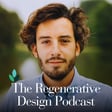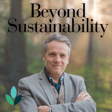
Ep. 17: Bill Wyatt - Biochar and Beyond: Turning Waste into Wealth with Eco-Friendly Business Strategies
“Biochar’s ability to turn waste into value is a paradigm shift. It’s not just about cleaning up; it’s about creating lasting impact for communities and industries worldwide.”
If you’ve never heard of biochar, prepare to have your mind blown. This carbon-rich powerhouse is revolutionizing industries by turning waste into opportunity—boosting soil health, reducing water usage, and even cutting carbon emissions in construction. In this episode, we explore how integrating biochar into business practices isn’t just eco-friendly; it’s a game-changing strategy for sustainable growth.
Bill Wyatt, founder and CEO of Red Mountain Biochar, shares his journey from the lumber industry to leading an innovative company that’s making a global impact. With bold projects in Tanzania, India, and beyond, Bill explains how biochar improves soil health, reduces water usage, and even makes concrete carbon-neutral—all while building a sustainable business model.
Bill Wyatt is a third-generation lumberman turned eco-entrepreneur. As the leader of Red Mountain Biochar, he’s creating a blueprint for combining sustainability and profitability, proving that business can be a force for environmental good. His work spans continents and industries, making him a pioneer in the regenerative business movement.
Learn more about Bill:
Websites:
• Red Mountain Biochar: https://redmountainbiochar.com
• International Biochar Initiative: https://biochar-international.org
Further research:
• “The Biochar Solution” by Albert Bates
• “Burn: Using Fire to Cool the Earth” by Albert Bates and Kathleen Draper
Explore these valuable resources to further your journey in regenerative design:
Discover more about Regenerative design at Paulownia Landscape Architects. https://www.paulownia-la.com/.
Dive into the Twelve Laws of Nature and unlock the secrets of harmonizing with our planet at https://www.12lawsofnature.com/.
Fulfill your garden aspirations with expert guidance from the Garden of Your Dreams masterclass at https://www.gardenofyourdreams.com/.
Ready to take actionable steps towards your dream garden? Book a complimentary 30-minute training session with Matthieu for immediate results: https://calendly.com/garden-of-your-dreams.














